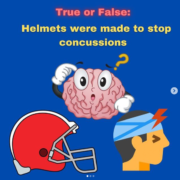Concussions and Helmets

Concussions and Helmets
A lot of time and resources have gone into methods to reduce concussion in sports. There’s a lot of speculative stuff out there, but most of it has yet to be proven in a meaningful way.
The biggest myth is that newer generation helmets can protect against concussion in football. The evidence on this is really poor.

The problem is that a helmet was never really intended to prevent a concussion. It was meant to protect against skull fractures!
Our helmets do a great job protecting our bones from breaking, but they can’t really stop the transmission of forces that travel into the brain and shear some of those delicate axons.
Some have even made the case that because helmets protect our skulls so well, that new helmets have been increasingly weaponized in tackling forms that may increase concussive injury. For better or worse, rules against targeting have started to reduce this problem.
So what can protect us from concussion in sports?

So far the best evidence is to avoid head and neck contact, especially in earlier age groups.
There are studies going on looking at therapeutic tools like vision training, neck muscle training, specialized mouth guards, and specialized neck collars.
The truth is that the evidence for these things are still early and flawed, so we can’t say anything with confidence yet.
In the meantime, the best things we can do is to make ourselves maximally prepared in strength, awareness, and reaction time so we can avoid the hits that may cause our brains harm.





